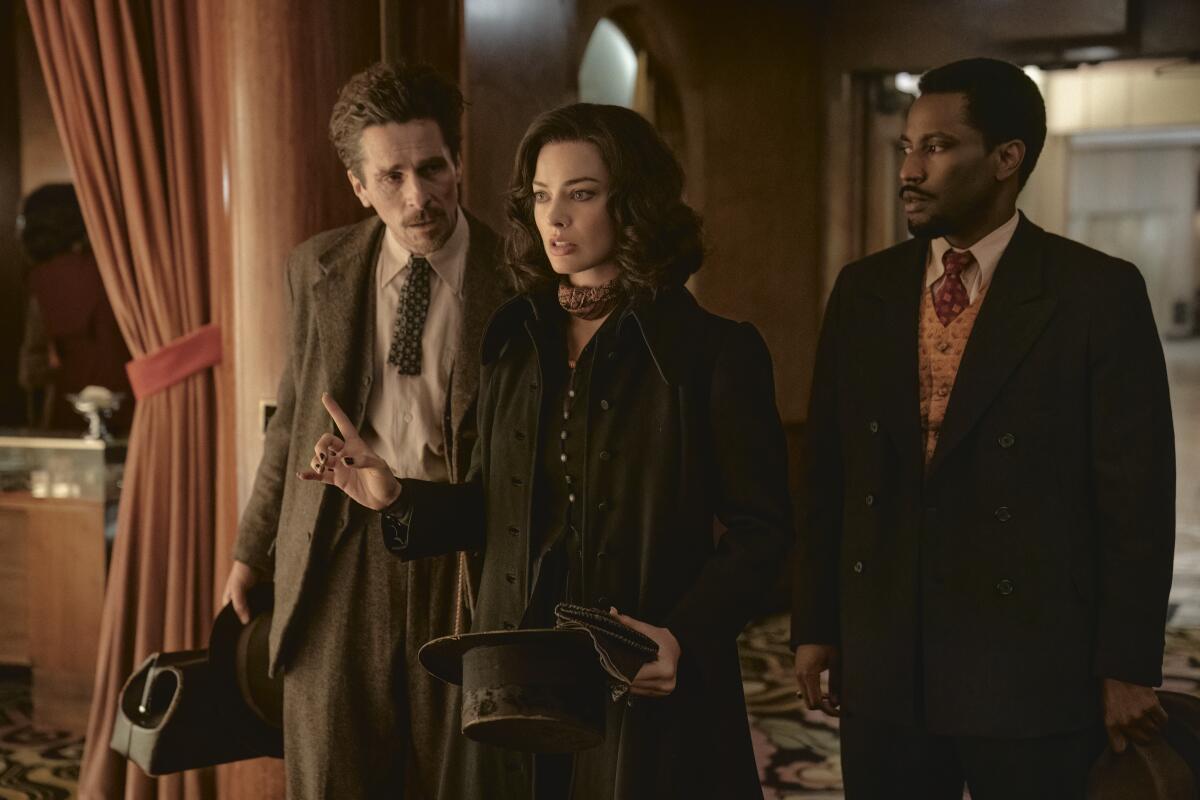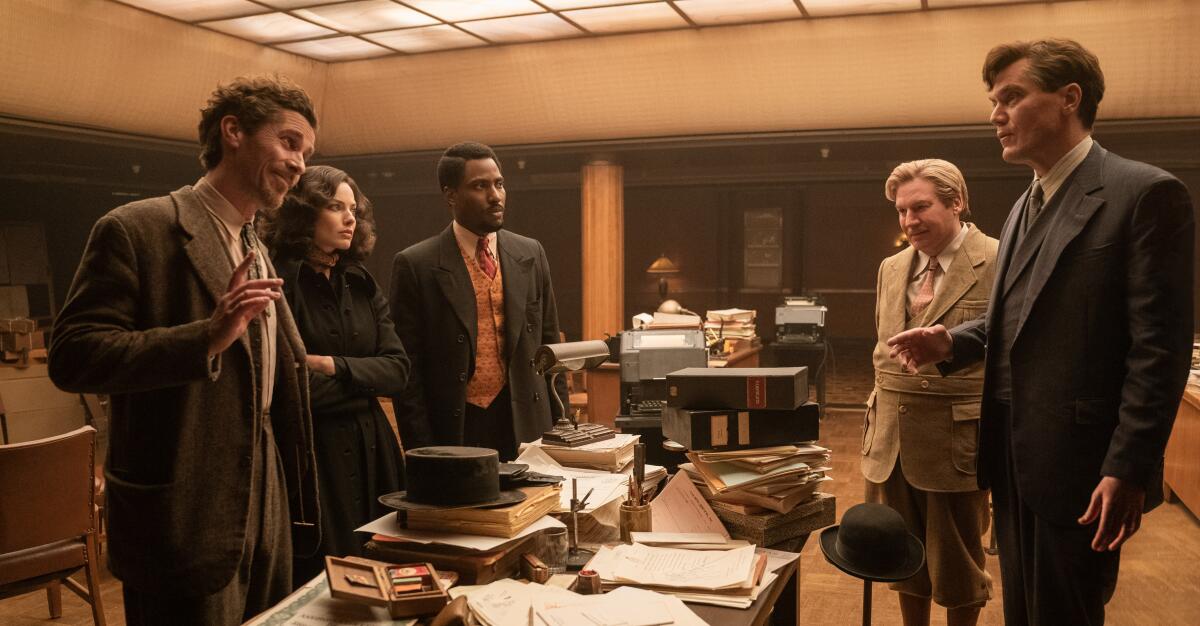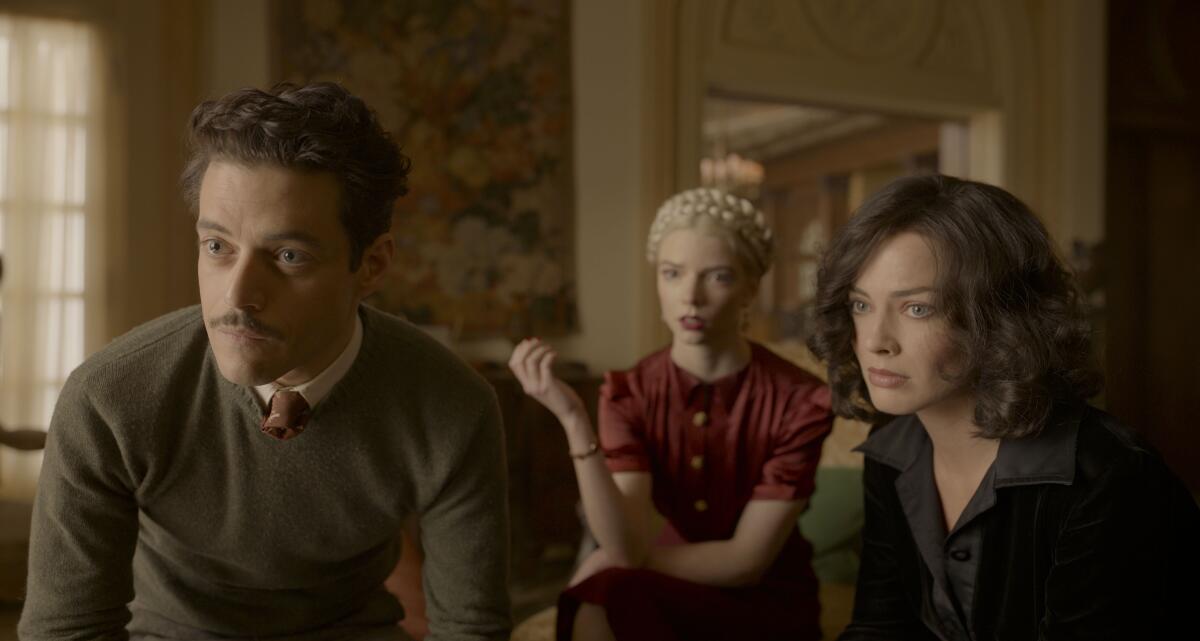Review: David O. Russell goes to war in ‘Amsterdam,’ but this historical farce Nether comes together

- Share via
The title of “Amsterdam,” the typically busy and discombulating new movie written and directed by David O. Russell, refers to the events of a memorable Dutch idyll in 1918, toward the end of the First World War. For two wounded American servicemen, Burt Berendsen (Christian Bale) and Harold Woodman (John David Washington), and a nurse, Valerie Voze (Margot Robbie), overseeing their recovery, the city of Amsterdam becomes a temporary refuge and playground. The French New Wave may still be decades away, but there’s an invigorating dash of Truffaut (but really, true-friend) energy to these proceedings. For a few tender, spirited moments you might be reminded of “Jules and Jim” or perhaps Godard’s “Band of Outsiders,” even when Burt’s shot-up face is wrapped in bandages or when Valerie, an aspiring Dadaist, is molding sculptures from the bloody bullets and shrapnel she’s extracted from her patients’ wounds.
Russell himself pushed the carnage of war to aesthetic extremes in 1999’s “Three Kings,” when he turned his camera into an X-ray and showed us — in squirm-inducing, viscera-rupturing detail — what a bullet can do to the human body. While it features its own lovingly detailed glimpses of torn flesh and lingering scars, “Amsterdam” seems rather less inclined to get too deep inside its characters, physically or otherwise. Like Russell’s splendid ’70s caper, “American Hustle” (2013), the movie is a roving piece of period whimsy and a madcap history lesson, a parade of concealed motives and cunning switcheroos loosely inspired — and just barely held together — by real-world events. (It also shares with that movie a few gifted Russell regulars, including production designer Judy Becker and editor Jay Cassidy.)
For your safety
The Times is committed to reviewing theatrical film releases during the COVID-19 pandemic. Because moviegoing carries risks during this time, we remind readers to follow health and safety guidelines as outlined by the CDC and local health officials.
But unlike “Hustle,” “Amsterdam” only fitfully locates the moment-to-moment comic verve — or the bittersweet sense of longing — that would give these characters and their farcical shenanigans the deeper human resonance it’s clearly aiming for. What the movie boasts instead is a lot of surface-level freneticism, done in a now-ritualistic Russell mode of controlled chaos that more often than not turns creakily mechanical. There’s a flashback-juggling structure, a large ensemble cast that seems to multiply by the minute and a lot of drunk and disorderly camerawork (vaguely recognizable as that of the gifted Emmanuel Lubezki) that dances its way through scene after scene of rambunctiously choreographed action.

That action kicks off in New York in 1933; the interwar years are slowly rumbling to a close, and whispers of unrest can be heard beneath the bustling city noise and the notes of Daniel Pemberton’s airily charming score. Joining forces not for the first time, Burt, a doctor, and Harold, an attorney, are quietly brought in to investigate the sudden demise of an Army general, Bill Meekins (Ed Begley Jr.), who commanded their regiment during World War I. Taylor Swift pops up for a suitably swift cameo as Meekins’ daughter, Liz, hanging around just long enough to voice her teary-eyed suspicions of foul play before leaving the dogged Burt and Harold to figure out what’s going on.
So begins a shaggily plotted whodunit that the movie approaches with a sometimes charming, sometimes tiresome and faintly Raymond Chandler-esque reluctance to solve. Unsurprisingly, Russell crams in as many odd jolts and detours as possible, among them an impromptu autopsy (made bearable by Zoe Saldaña as a nurse who’s stolen Burt’s heart), a few violent ambushes and one or two relaxing conversations on the subject of birdwatching. (Michael Shannon and Mike Myers pop up as charming amateur ornithologists, though as with almost everyone here, there’s a bit more to their identities than meets the eye.) Along the way, Russell slides in that crucial 1918 flashback: We see Burt, who’s part Jewish, being shipped off to war by his status-conscious wife, Beatrice (Andrea Riseborough), and her relatives, whose antisemitism is as plain as their Park Avenue address. Burt becomes a medic with a unit modeled on the famous 369th Infantry Regiment, tending mostly to Black soldiers, like Harold, shunned by their white fellow servicemen.
For all the scurrying randomness of incident in “Amsterdam,” there’s nothing accidental about the lifelong friendship that develops between Burt and Harold, both of whom bleed in service of a racist country that despises them. (Burt even loses an eye and will spend much of the story popping a glass one in and out of its socket — an overdone bit that nonetheless packs some metaphorical punch in a movie about not always trusting what you see.) The two men are sent to hospital in Paris, where they meet the captivating Valerie, and then it’s off to those blissful days of recovery and revelry in Amsterdam. It’s here that the movie briefly spreads its wings, animated by the capriciousness of the central performances — Robbie’s mercurial wit, Washington’s seductive cool, Bale’s big heart and frizzy hair — and by a freewheeling sense of la vie bohème possibility. For a few moments, it feels as if the movie really could go anywhere.

But that feeling can’t last. Burt returns to awful Beatrice in New York, the mutually smitten Harold and Valerie go their separate ways, Amsterdam becomes a distant memory and “Amsterdam” itself comes crashing to earth. Returning to 1933, Russell does try to keep spirits aloft and the narrative engine going, though more often than not it stalls out. Burt and Harold’s investigation turns up still more supporting players, including Rami Malek and Anya Taylor-Joy as a wealthy, gabby married couple and Matthias Schoenaerts and a memorably testy Alessandra Nivola as two nosy police officers. (I’m still trying to parse Chris Rock’s narrative function, or at least figure out why the actor — reportedly so funny on the set that Bale had to avoid him to stay in character — feels so wasted here.) Amid these and other complications, our heroes will expose the roots of a sinister conspiracy, hatched by industrialists eager to overthrow Franklin D. Roosevelt’s presidency and hasten the rise of fascism across and beyond Europe.
“A lot of this really happened,” the script declares at the outset, deploying the kind of cheeky disclaimer language (similarly used in “American Hustle”) that allows a movie to pat itself on the back for its partial accuracy and its bold departures from the historical record. The story does jolt to life — and acquire a real center of moral gravity — once Robert De Niro shows up as the distinguished Gen. Gil Dillenbeck, a fictionalized stand-in for Maj. Gen. Smedley Butler, who ultimately brought the so-called Business Plot to public light. Still, in Russell’s topsy-turvy cosmos, historical accuracy is but one measure of truthfulness: If liberal despair has long been his guiding thematic light (especially in his delirious 2004 farce, “I Heart Huckabees”), then here it’s the many recent and ongoing threats to global democracy that have him none too subtly wringing his hands.
That gives “Amsterdam” a certain currency in a world still reeling from the presidency of Donald Trump and the attendant rise of far-right politicians all over the globe. But there’s a nagging half-heartedness to these bids for topicality, and something less than conviction in the movie’s semisweet encouragement of optimism in the face of mounting danger. This isn’t the first (or probably the last) Russell entertainment to pull its characters back from the brink of unfathomable chaos, or to encourage its characters and its audience to give peace, love and understanding a chance. But if the memory of Amsterdam hovers over Burt, Harold and Valerie like a beacon from happier, more innocent times, then “Amsterdam” itself is another bittersweet callback, a reminder — and, only fitfully, a reclamation — of a filmmaker’s lost vitality.
‘Amsterdam’
Rating: R, for brief violence and bloody images
Running time: 2 hours, 14 minutes
Playing: Starts Oct. 7 in general release
More to Read
Only good movies
Get the Indie Focus newsletter, Mark Olsen's weekly guide to the world of cinema.
You may occasionally receive promotional content from the Los Angeles Times.











